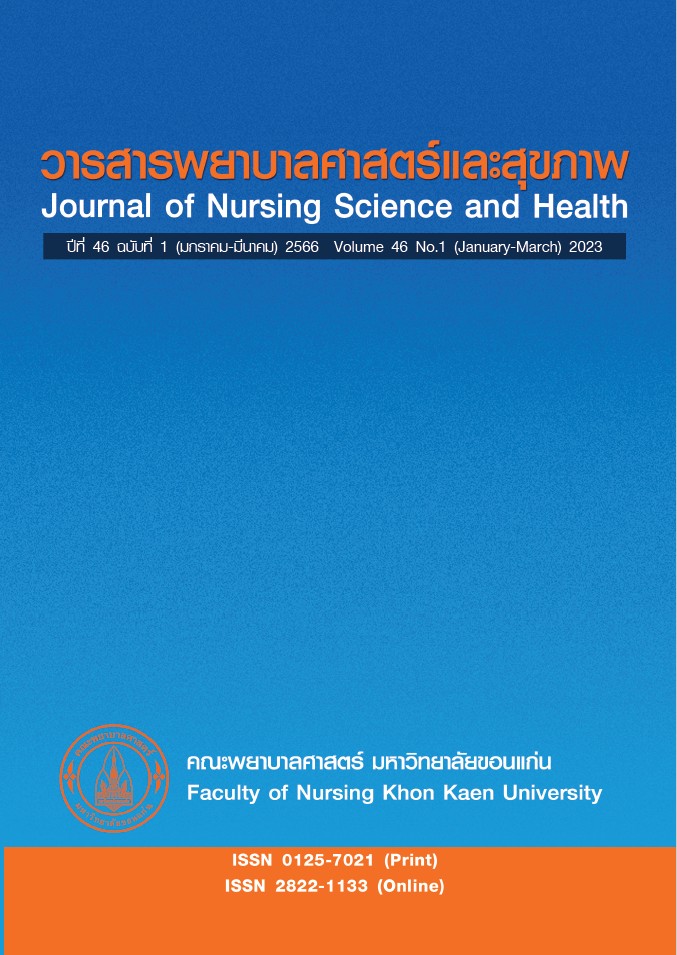ผลการเรียนรู้ทางออนไลน์ต่อความรู้และการปฏิบัติในผู้ป่วยที่ได้รับการผ่าตัด ทำทางเบี่ยงหลอดเลือดหัวใจ
คำสำคัญ:
การเรียนรู้ทางออนไลน์ , ความรู้, การปฏิบัติ, ผ่าตัดทำทางเบี่ยงหลอดเลือดหัวใจบทคัดย่อ
การวิจัยแบบก่อนทดลองครั้งนี้ มีวัตถุประสงค์เพื่อศึกษาผลการเรียนรู้ผ่านสื่อออนไลน์ต่อความรู้และการปฏิบัติได้ในผู้ป่วยที่ได้รับการผ่าตัดทำทางเบี่ยงหลอดเลือดหัวใจ
กลุ่มตัวอย่างเป็นผู้ป่วยที่นัดผ่าตัดทำทางเบี่ยงหลอดเลือดหัวใจเป็นครั้งแรก จำนวน 49 ราย ได้รับสื่อวีดีทัศน์เพื่อเรียนรู้ด้วยตนเองผ่านทางออนไลน์ที่มีข้อมูลเนื้อหาเกี่ยวกับความรู้และการปฏิบัติตัวในระยะก่อนผ่าตัด เพื่อฟื้นฟูสมรรถภาพหลังผ่าตัดขณะพักรักษาตัวอยู่ในโรงพยาบาล เก็บรวบรวมข้อมูลโดยใช้แบบประเมินความรู้ก่อนและหลังการเรียนรู้ด้วยตนเองทางออนไลน์ภายใน 2 สัปดาห์ แบบประเมินการปฏิบัติได้ในระยะ 5 วันหลังผ่าตัด ตรวจสอบคุณภาพเครื่องมือวิจัยจากผู้ทรงคุณวุฒิ จำนวน 3 ท่าน ค่าสัมประสิทธิ์สหสัมพันธ์เท่ากับ .74 และ .93 ตามลำดับ วิเคราะห์ข้อมูลทางสถิติด้วยค่าเฉลี่ย ส่วนเบี่ยงเบนมาตรฐาน เปรียบเทียบความแตกต่างของค่าเฉลี่ยคะแนนความรู้ก่อนและหลังการเรียนรู้ผ่านสื่อออนไลน์ และคะแนนการปฏิบัติตัวได้ด้วยสถิติ paired t-test
ผลการวิจัยพบว่า คะแนนเฉลี่ยด้านความรู้หลังการเรียนรู้ด้วยตนเองผ่านสื่อออนไลน์มากกว่าก่อนการเรียนรู้อย่างมีนัยสำคัญทางสถิติ (p<.001) โดยคะแนนเฉลี่ยก่อนการเรียนรู้ คือ 69.47+ 8.77 คะแนนเฉลี่ยหลังการเรียนรู้ คือ 88.56+ 3.73 และคะแนนเฉลี่ยโดยรวมของการปฏิบัติได้ในระยะหลังผ่าตัด 5 วัน ของกลุ่มตัวอย่างทั้งหมด คือ 80.49+ 17.85 ผลลัพธ์จากการศึกษาในครั้งนี้เป็นไปตามสมมุติฐานงานวิจัย
เอกสารอ้างอิง
World Health Organization (WHO). Cardiovascular diseases (CVDS). (2017). Available from: https://www.who.int/en/news-room/fact-sheets/detail/cardiovascular-diseases-(cvds)
Epidemiology Division, Department of Disease Control, Ministry of Public Health. Coronary artery disease (CAD) situation in 2019; 2019. Available from: https://ddc.moph.go.th/uploads/ files/1081120191227084415.pdf (in Thai)
Department of Cardiovascular-Thoracic Surgery Outpatient, Rajavithi Hospital. The statistical number of coronary artery bypass grafting patients. Bangkok: Rajavithi Hospital; 2016-2018; p.1. [copied document]. (in Thai)
Voramont B. Process of cardiac rehabilitation. In: Voramont B, editor, Cardiac rehabilitation: Coronary artery disease. Bangkok: L.T. Press Co; 2005. P.68-75. (in Thai)
Ruggeri K, Farrington C, Brayne C. A global model for effective use and evaluation of e-learning in health. Telemed J E Health2013;19(4):312-21.
Bandura A. Self efficacy: The exercise of control. New York: W.H. Freeman and Company. 1997.
Zarani F, Besharat MA, Sadeghian S, Sarami G. The effectiveness of the information-motivation-behavioral skills model in promoting adherence in CABG patients. J Health Psychol 2010;15(6):828-37.
Dupont WD, Plummer Jr WD. Power and sample size calculations: a review and computer program. Controlled clinical trials 1990;11(2):116-28. doi: 10.1016/0197-2456(90)90005-m.
Mansin A, Lerdkittikulyotin S, Lerttraikul N, Asdornwised U, Thanakiatpinyo T, Tantiwongkosri K. The effect of education program on knowledge and self-care ability in patients undergoing coronary artery bypass grafting. Nurs Sci J Thai 2016;34(1):17-26. (in Thai)
Mohsenipouya H, Majlessi F, Forooshani A, Ghafari R. The effects of health promotion model-based educational program on self-care behaviors in patients undergoing coronary artery bypass grafting in Iran. Electron Physician 2018;25;10(1):6255-64. Available from: https://pubmed.ncbi.nlm.nih.gov/29588828/
McLaughlin PA. Development and evaluation of preoperative teaching materials for CABG/Valve surgery patients. J Dr Nurs Pract 2019;12(1):73-92. doi: 10.1891/2380-9418.12.1.73.
Goodman H, Parsons A, Davison J, Preedy M, Peters E, Shuldham C, et al. A randomised controlled trial to evaluate a nurse-led programme of support and lifestyle management for patients awaiting cardiac surgery 'Fit for surgery: Fit for life' study. Eur J Cardiovasc Nurs 2008;7(3):189-95.
Scott KM, Baur L, Barrett J. Evidence-based principles for using technology-enhanced learning in the continuing professional development of health professionals. Contin Educ Health Prof 2017;37(1):61-6. Available from: https://pubmed.ncbi.nlm.nih.gov/28252469/
Curran V, Fleet L, Simmons K, Lannon H, Gustafson DL, Wang C, et al. Adoption and use of mobile learning in vontinuing professional fevelopment by health and human services professionals. J Contin Educ Health Prof 2019;39(2):76-85. Available from: https://pubmed.ncbi. nlm.nih.gov/30908401/
Savci S, Degirmenci B, Saglam M, Arikan H, Inal-Ince D, Turan HN, et al. Short-term effects of inspiratory muscle training in coronary artery bypass graft surgery: A randomized controlled trial. Scand Cardiovasc J 2011;45(5):286-93.
Stein R, Maia CP, Silveira AD, Chiappa GR, Myers J, Ribeiro JP. Inspiratory muscle strength as a determinant of functional capacity early after coronary artery bypass graft surgery. Arch Phys Med Rehabil 2009;90(10):1685-91.
Chen JO, Liu JF, Liu YQ, Chen YM, Tu ML, Yu HR, et al. Effectiveness of a perioperative pulmonary rehabilitation program following coronary artery bypass graft surgery in patients with and without COPD. Int J Chron Obstruct Pulmon Dis 2018;16(13):1591-7. Available from: https://pubmed.ncbi.nlm.nih.gov/29805258/
ดาวน์โหลด
เผยแพร่แล้ว
รูปแบบการอ้างอิง
ฉบับ
ประเภทบทความ
สัญญาอนุญาต
ลิขสิทธิ์ (c) 2023 วารสารพยาบาลศาสตร์และสุขภาพ

อนุญาตภายใต้เงื่อนไข Creative Commons Attribution-NonCommercial-NoDerivatives 4.0 International License.
วารสารพยาบาลศาสตร์และสุขภาพเป็นเจ้าของลิขสิทธิ์ในการเผยแพร่ผลงานที่ตีพิมพ์ห้ามผู้ใดนำบทความที่ได้รับการตีพิมพ์ในวารสารพยาบาลศาสตร์และสุขภาพไปเผยแพร่ในลักษณะต่าง ๆ ดังนี้ การนำบทความไปเผยแพร่ออนไลน์ การถ่ายเอกสารบทความเพื่อกิจกรรมที่ไม่ใช่การเรียนการสอน การส่งบทความไปตีพิมพ์เผยแพร่ที่อื่น ยกเว้นเสียแต่ได้รับอนุญาตจากวารสารพยาบาลศาสตร์และสุขภาพ



